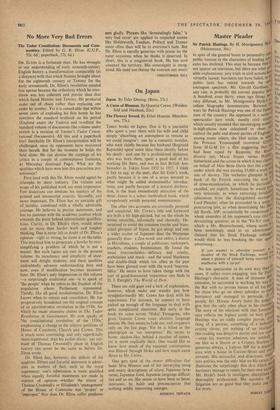No More Very Bad Errors
DR. ELTON is a fortunate man. He has wrought in our understanding of early sixteenth-century English history a transformation comparable (at a distance) with that which Namier brought about for the eighteenth century or Tawncy for the early seventeenth. Dr. Elton's revolution created less uproar because the orthodoxy which he over- threw was less coherent and precise than that which faced Namier and Tawney. He produced order out of chaos rather than replacing one order by another. Yet it is remarkable that within seven years of exploding his first bomb he has rewritten the standard textbook on his period (England under the Tudors) and re-edited the standard volume of documents (the volume under review is a revision of Tanner's Tudor Consti- tutional Documents). All this and a paperback too! Inevitably Dr. Elton's interpretation will be challenged, once its opponents have recovered their breath. But for the moment he holds the field alone. He can dismiss the carpings of his critics in a couple of contemptuous footnotes. as Macaulay dismissed Paget. What are the qualities which have won him this precocious pre- eminence?
First (and with this Dr. Elton would agree) he triumphs by sheer industry. The volume and scope of his published work are most impressive. Few historians can emulate his mastery of the printed and manuscript sources. Secondly, and more important, Dr. Elton has an enviable gift of lucidity, combined with a wholly admirable courage. He believes in precise statements, and has no patience with the academic caution which conceals the point behind interminable qualifica- tions. Clarity, in Dr. Elton's view, would often cost no more than harder work and tougher thinking. One is never left in doubt of Dr. Elton's opinion--right or wrong, he slams it on the table. This may lead him to perpetrate a howler by over- simplifying a problem of which he is not a master. But such lapses are rare in the present volume. Its trenchancy and simplicity of state- ment will delight students; and these qualities undoubtedly advance understanding here and now, even if modification becomes necessary later. Dr. Elton's only imprecision in this volume --a surprisingly traditional one--is to speak of 'the people' when he refers to the fraction of the population whom Parliament represented. Thirdly, like all good revolutionaries, Dr. Elton knows when to retreat and consolidate. He has progressively broadened out his original concept of an administrative revolution in the 1530s, for which he made excessive claims in The Tudor Revolution in Government, He now speaks of 'the constitutional revolution of the 1530s,' emphasising a' change in the relative positions of House of Commons, Church and Crown. This is much more convincing, and only superficially more traditional, than his earlier thesis: our esti- mate of Thomas Cromwell's place in English history can never be the same as before Dr. Elton wrote.
Dr. Elton has, however, the defects of his qualities. Direct and forceful statement is admir- able in matters of fact, such as the royal supremacy; one's admiration is more qualified when equally forceful statements are made in matters of opinion--whether the extent of Thomas Cromwell's or Elizabeth's 'management' of the House of Commons was 'proper' or 'improper.' Nor does Dr. Elton suffer predeces- sors gladly. Phrases like 'devastatingly false,' a very bad error' are applied to respected names like Holdsworth, Leadam, Pollard and Tanner more often than will be to everyone's taste. But Dr. Elton is equally generous with praise on the rarer occasions when he thinks it deserved. In short, this is a magisterial book. He has now annexed his territory. His sovereignty is recog- nised. He need not thump the rostrum any more.
CHRISTOPHER HILL


































 Previous page
Previous page